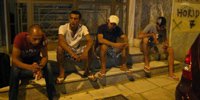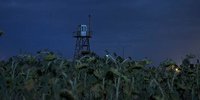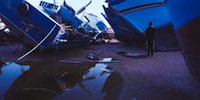Shorts Night: Far from Home
“You have nowhere to go. Nowhere to go,” whispers Habib Aydin as he captures a wild bird in a crude wooden cage on the outskirts of his village in south-east Turkey. This is one of the most symbolic scenes in Reber Dosky’s The Call, which follows the story of Habib and his determination to call his only son Ramazan back to settle in the village they fled in 1989. While Habib returned 7 years ago to remarry, his first family remained in Istanbul. “What does this village have to offer?” Ramazan asks during a short visit to see his father. Habib replies: “animals, rocks… what does it not have?” Touched with humour and a soundtrack of birdsong and bleating goats, Dosky presents a story about loss of tradition across a generational divide, where the disconnect between love of family and land is felt keenly.
 Xenos, a short by Mahdi Fleifel, follows a group of impoverished Lebanese youths trapped in Greece which is in the grip of economic disaster. Their hopeless existence unfolds in a telephone conversation, played over shots of streets lined with drug addicts cowering in shuttered shop porches. The camera is grainy and uncomfortably intrusive, reflecting the desperate measures they take for money to buy hard drugs. “I’ve tried to mingle with the Greeks,” one youth says, “but when you do, they assume you are gay. They say ‘you want sex?’” Speaking of how they sell their bodies to strangers in a nearby park, another reflects. “This country ruins your soul.”
Xenos, a short by Mahdi Fleifel, follows a group of impoverished Lebanese youths trapped in Greece which is in the grip of economic disaster. Their hopeless existence unfolds in a telephone conversation, played over shots of streets lined with drug addicts cowering in shuttered shop porches. The camera is grainy and uncomfortably intrusive, reflecting the desperate measures they take for money to buy hard drugs. “I’ve tried to mingle with the Greeks,” one youth says, “but when you do, they assume you are gay. They say ‘you want sex?’” Speaking of how they sell their bodies to strangers in a nearby park, another reflects. “This country ruins your soul.”
 Tuna Kaptan and Felicitas Sonvilla offers a different perspective of the conventional refugee narrative in Two at the Border, by focusing on the plight of two smugglers stationed at the Turkish city of Edirne near Greece. Ali, from Syria, and Naser, from Palestine, form a strong bond through their shared financial hardship and longing for home. “I thought about returning to Palestine,” Naser admits in the confines of his apartment. “My parents are seriously ill. They cry on the phone for me to come home. I haven’t been able to send a single lira back.” Stuck in their own limbo, their lives consist of traversing the distance between their apartment and the heavily patrolled borders.
Tuna Kaptan and Felicitas Sonvilla offers a different perspective of the conventional refugee narrative in Two at the Border, by focusing on the plight of two smugglers stationed at the Turkish city of Edirne near Greece. Ali, from Syria, and Naser, from Palestine, form a strong bond through their shared financial hardship and longing for home. “I thought about returning to Palestine,” Naser admits in the confines of his apartment. “My parents are seriously ill. They cry on the phone for me to come home. I haven’t been able to send a single lira back.” Stuck in their own limbo, their lives consist of traversing the distance between their apartment and the heavily patrolled borders.
 In October 2013, a boat carrying 500 Eritrean refugees sunk off the coast of the Italian island Lampedusa. More than 360 people drowned. Morgan Knibbe’s Shipwreck is a testament to the horrors faced by those who resort to crossing into Europe by sea. The camera sways and lurches as hundreds of coffins are loaded onto a military ship at the harbour. Between the hysteria and silence of loss, one survivor, Abraham, whispers his story as he walks through a graveyard of shipwrecks.
In October 2013, a boat carrying 500 Eritrean refugees sunk off the coast of the Italian island Lampedusa. More than 360 people drowned. Morgan Knibbe’s Shipwreck is a testament to the horrors faced by those who resort to crossing into Europe by sea. The camera sways and lurches as hundreds of coffins are loaded onto a military ship at the harbour. Between the hysteria and silence of loss, one survivor, Abraham, whispers his story as he walks through a graveyard of shipwrecks.
 In the last film of the evening, Adrift, Frederik Jan Depickere follows the story of Simu, a Ugandan who fled political persecution. He now works as a construction site cleaner 150km above the Arctic Circle. With all his family dead or missing, Simu stares out over the ghostly tundra landscape. “I used to dream of being a pop singer,” he says. “But according to my situation now, I think that dream is dead.” The camera pans over a field of snow peppered with bare black trees. “I don’t belong here. But at home they would just make me disappear.”
In the last film of the evening, Adrift, Frederik Jan Depickere follows the story of Simu, a Ugandan who fled political persecution. He now works as a construction site cleaner 150km above the Arctic Circle. With all his family dead or missing, Simu stares out over the ghostly tundra landscape. “I used to dream of being a pop singer,” he says. “But according to my situation now, I think that dream is dead.” The camera pans over a field of snow peppered with bare black trees. “I don’t belong here. But at home they would just make me disappear.”
For more information on the LSE Literary Festival 2015, click here.
